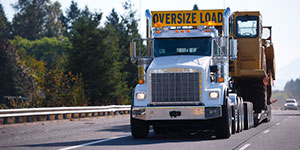More information about heavy-haul equipment
In some ways, heavy-haul equipment is similar to a flatbed trailer hauling an oversize load. But that is just about where the similarities end. Heavy-haul trailers are designed specifically to haul items like large construction equipment and energy-generating windmill blades. Several types of specialized trailer equipment are used to carry these heavy loads, or “super loads,” as they are often called. A description a few trailer types intended for heavy hauling include:
• Step-deck: a two-level trailer designed for hauling tall loads.
• Removable Goosenecks: flatbed trailers with removable necks normally connecting the trailer and truck. When detached, the front end lower to the ground and served as a built-in ramp allowing self-powered cargo (i.e., vehicles and equipment) to drive onto the deck.
• Double-drop or “Lowboys” : Lowboys are designed to carry the tallest loads allowable in most states.
• Stretch/Extendable Trailers: These trailers, also known as “telescopic,” are designed with a sliding feature allowing the length of the trailer to be adjusted. Typical cargo hauled by telescopic trailers includes lumber, rebar, trusses, steel beams, telephone poles, etc.
• Other trailers: Examples of additional and less commonly seen heavy-haul trailers include: Nine-axle tractor combination with transformer deck; “Blade” trailers; 13-axels tractor trailer combination trailers; and “Schnabel” trailers.
Heavy-haul trucking requires expensive equipment, and most carriers have few, if any, of the specialized trailers in their fleets. Because heavy-haul cargo is not something many customers require on a regular basis, unless the company’s demand is high enough, most heavy-haul drivers are hired by carriers specializing in using heavy-haul equipment.
The name “heavy-haul” implies strength, and strength and durability are important traits for heavy-haul drivers. The weight of a typical heavy-haul load makes steering more difficult than a typical load such as a dry van. Making wide turns to prevent trailers from hitting obstacles on the shoulders of roads often require multiple starting, stopping, backing up, and similar maneuvers best suited for manual transmissions.
Drivers of heavy-haul equipment must, like all drivers, be on the lookout for potential safety issues. A heavy-haul driver must be aware of barriers in a wider path than a normal driver. The long trailers require attention to longer distances in sideview barriers as well as wider areas, especially when turning corners.
A very important characteristic of a heavy-haul driver is to be a team player. Heavy-haul drivers may be the only person in the truck, but a full team of route-planners, employees loading and securing cargo, pilot-vehicle drivers, and sometimes state or public highway authorities, including law enforcement, all must work together to ensure a safely-delivered load.
While endorsement for heavy-haul drivers are the same for any driver pulling a particular type of cargo, a firm planning a heavy-haul route must coordinate with state or local authorities, often gaining a permit based on special requirements of the route being driven (such as weight limitations on bridges, height limitations of overpasses, traffic patterns, etc).
In heavy-haul driving, the number of miles is not as important as the difficult of the route and time involved in completing delivery. Heavy loads are most often driven at slow speeds. While a dry van driver may cover the planned route in 24 hours of drive time, a heavy-haul driver may need up to double the amount of time.
Heavy-haul drivers are often the most skilled and experienced drivers in the trucking industry and are paid a premium for their rare skills. If working for a specialized heavy-haul carrier, these drivers may be paid an hourly wage or salary that is often well-above other drivers; in fact, heavy-haul drivers are among the highest paid truck drivers.
Job search faqs
jobs.thetrucker.com is one of the leading sources for truck driving and diesel mechanic job listings, and its primary objective is to connect professional drivers and mechanics with jobs. jobs.thetrucker.com’s job search functionality is designed to be simple and easy to use, and allows you to search for jobs by state, by carrier and various other search criteria.
Once you apply for a job, we match your qualifications to the appropriate job listings and send your application to the hiring companies immediately.
jobs.thetrucker.com’s job search functionality is designed to be simple and easy to use, and allows truck drivers and diesel mechanics to search for jobs by state, by carrier and various other search criteria. When searching for jobs, you may set the search criteria to be as specific or general as you want to find the job that is best for you.
jobs.thetrucker.com adds and updates job listings immediately as new truck driving and diesel mechanic job listings are received. So it is best to visit jobs.thetrucker.com regularly for updated job listings when in the market for a new truck driving or diesel mechanic job.
No! Drivers and mechanics may access job listings, job resources and submit job applications on jobs.thetrucker.com free of charge using their phone, desktop or any other device.
Yes! We encourage you to apply for all jobs that you have an interest and that match your qualifications. Applying for multiple jobs increases your chances of finding the best job for you.
After you have submitted your application on jobs.thetrucker.com, you will receive an email confirmation that your application has been received.
If you do not receive this confirmation email, please check your spam or junk folder. If you determined you did not receive the email confirmation, please Contact Us.
jobs.thetrucker.com processes job applications immediately and automatically sends driver and mechanic applications to the hiring company once we confirm your qualifications meet the job requirements.
Companies' response time may vary based on the urgency of their hiring needs, the number applications the comppany receives and the resources dedicated to processing applications. Applicants increase their chances of being contacted by applying to all jobs that meet their qualifications.
Carrier may or may not respond to all applications depending on their hiring policies, procedures and driver needs. And, it is possible that a carrier will not respond to applicants if their experience does not match the hiring requirements. Applicants will increase their chances of being contacted by carriers by applying to all jobs that meet their qualifications.
Along with all truck driving and diesel mechanic job listings, jobs.thetrucker.com provides information about all carriers offering jobs in the carrier’s information page. Each carrier’s information page is accessible from the each individual job listing, and from the "Carriers List" in the "Resource" drop down.
A commercial driver license (CDL) is a license required to operate large, heavy, or hazardous material vehicles in the US. The class of CDL a truck driver depends on the type of commercial motor vehicle operated. A truck driver may hold a CDL in one of three classes: Class A, Class B, and Class C.
Driver Type refers to the employment arrangement a driver operates. The most common truck driver arrangements include:
- Company Driver: Drivers employed by a specific carrier with its own fleet of trucks. Companies can be carriers that contract to transport freight, or companies that carry their own freight.
- Lease-Purchase: Drivers hired by carriers where the truck is leased to the individual driver.
- Owner Operator (OO): Drivers who own the truck and operate as an independent business (also referred to as an "independent contractor").
- Team Driver: Drivers operating with a partner who shares driving duties.
Hauling Type (or trailer type, or equipment type) refers to the type of cargo being hauled. Different types of cargo materials require different types of trailers, and each type of trailer requires unique driver experience.
Endorsements are required certifications for CDL holders hauling various types of equipment and freight. The most common endorsements for long haul truck drivers include:
- Doubles/Triples: required for drivers hauling double or triple trailers.
- HazMat: required for transporting hazardous materials.
- Tanker: required for operating a vehicles designed with a permanent or temporary tank attached.
The information you provide when submitting a job application is secured by an encrypted SSL security certificate because the privacy of your personal information is important to us. See our Privacy Policy and Terms of Service.
Finding the right diesel mechanic job requires careful consideration of various factors. Research potential employers’ reputation and culture, evaluate compensation packages, and confirm that long-term growth and advancement opportunities fit with your career goals. Other factors to consider include: your own level of experience, skill and industry specialization vs the job requirements; CDL license requirements; tool requirements; location; training and professional development opportunity; work schedule, flexibility and work-life balance. For key considerations for finding a job as a heavy-duty truck diesel mechanic or technician, visit our Diesel Mechanic Job Resources.
Diesel mechanic certifications represent an industry recognized level of knowledge and expertise in a particular area of diesel engine diagnosis, repair or maintenance. These advanced certifications are offered by the National Institute for Automotive Service Excellence (ASE) and enhance a mechanic’s skill set and positively impact their qualifications and salary. Certifications may be obtained in specific areas such as gasoline and diesel engines, drive trains, brakes, suspension and steering, electronics, HVAC and preventative maintenance. For a listing of ASE certifications available specifically for heavy-duty truck mechanics, visit our Diesel Mechanic Job Resources.



